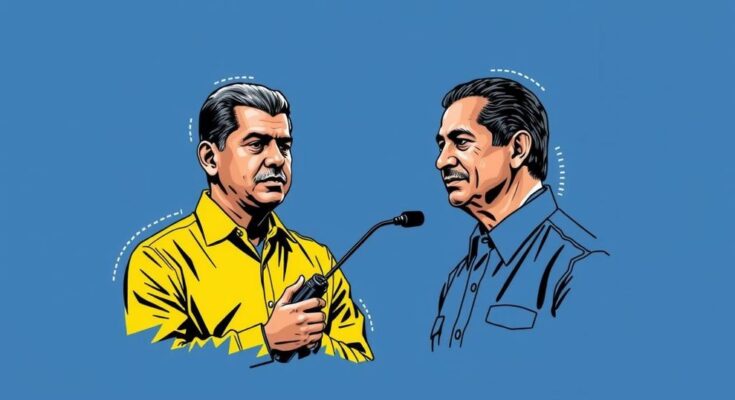The United States has imposed new sanctions targeting over 20 Venezuela officials connected to President Nicolas Maduro, aimed at prompting acceptance of the July election results. The sanctions encompass military personnel from various security branches and follow recent formal recognition of opposition leader Edmundo Gonzalez as president-elect. U.S. officials see these actions as part of a strategy to encourage democracy and accountability amidst ongoing political repression.
On Wednesday, the United States implemented additional sanctions targeting over 20 officials associated with Nicolas Maduro’s authoritarian regime in Venezuela. The intent behind these sanctions is to compel Maduro to acknowledge the results of the presidential election held in July. As the four-month anniversary of the election approaches, U.S. officials are optimistic that these measures will encourage members of the Maduro government to abandon their loyalties and seek a democratic transition.
The newly announced sanctions specifically affect military and security personnel within the Bolivarian National Guard, Bolivarian National Police, and related sectors. Among those sanctioned include Anibal Coronado, Maduro’s newly appointed chief of staff, Communication Minister Freddy Ñañez, and intelligence director Alexis Rodriguez. Despite broader oil sanctions and specific licenses allowing certain companies, such as Chevron, to operate within Venezuela, U.S. officials emphasize that these are under continuous review.
This announcement follows the recent formal recognition by the United States of Venezuelan opposition leader Edmundo Gonzalez as the president-elect, succeeding the disputed election results of July 28. Secretary of State Antony Blinken affirmed that “The Venezuelan people spoke resoundingly on July 28 and made Edmundo Gonzalez the president-elect. Democracy demands respect for the will of the voters.”
Administration officials elucidate that the sanctions are part of a broader strategy during the Biden administration to foster democratic progress in Venezuela and to hold accountable those involved in oppressive practices against the Venezuelan people. They acknowledged the impending transition of administration set for January 20, suggesting that the incoming administration might reassess the U.S. approach toward Venezuela.
The U.S. has sanctioned many members of Maduro’s cabinet since the onset of the Venezuelan crisis in 2017. Nicolas Maduro himself has faced sanctions since July 31, 2017, and in 2020, the Department of Justice charged him with drug trafficking and terrorism-related crimes, offering a reward of up to $15 million for information leading to his arrest or conviction.
The international community, including the United States, has exhibited significant concern over the political situation in Venezuela, particularly under Maduro’s rule, which has been marred by allegations of authoritarianism. The sanctions imposed by the United States are a continuation of its efforts to promote democratic governance in Venezuela and to pressure the Maduro regime to respect electoral outcomes and diminish its oppressive tactics. The recognition of opposition leader Edmundo Gonzalez as president-elect signals a critical stance against Maduro’s administration in light of allegations surrounding the legitimacy of the July presidential election.
In conclusion, the recent sanctions on Venezuelan officials reflect the United States’ persistent effort to hold the Maduro regime accountable and foster a return to democratic norms in the country. With the recognition of Edmundo Gonzalez as president-elect, the U.S. reinforces its commitment to supporting the Venezuelan populace’s choice against political repression. As the new administration approaches, potential changes in U.S. policy toward Venezuela may emerge, warranting close observation.
Original Source: www.cnn.com




